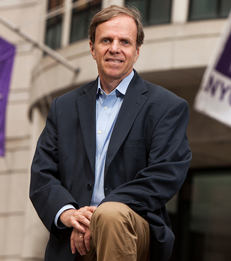By Kelsea Ballantyne
When I joined the U of M Presidents Committee for Labor Standards and Human Rights last year, I had no idea how much it would open my mind to the power universities have to transform global supply-chains.
Helping to organize the Symposium on Global Human Rights & Labor Standards (commemorating the 15th year of the committee), brought me even more awareness of this enormous potential as well as a sense of the huge responsibility we bore to ensure that this event would push conversations to action. I knew the market for university branded goods was large, but I had no idea that the market for collegiate licensed merchandise was worth more than $4.5 billion last year.
Following U-M President Schlissel’s opening remarks, Michael Posner, Assistant Secretary of State for Democracy, Human Rights, and Labor, presented his argument for the role of American Universities in a globalized world citing university endowments ($450 billion dollars), food service, construction of new buildings, etc. “Each year, American colleges and universities spend hundreds of billions of dollars on commercial contracts for goods and services.”
Wow! Clearly universities can have important impacts on the global supply chain. As students, we spend so much time, energy and money on educating ourselves. But what if we could also positively impact human rights and environmental sustainability around the world by influencing how the University spends its money?
The conversations that followed provided direction for action. Richard M. Locke, Director of the Watson Institute for International Studies at Brown University, provided examples of his research with students comparing capacity building programs against audits and compliance programs with companies like Apple and Nike. These studies found that capacity building programs created more efficiencies and higher labor standards, leading to higher margins for companies–Ah ha– The business case for better labor standards!
U-M graduate student, Kristine Schantz remarked: “I appreciated the work that Dr. Richard Locke shared related to supply chain capability training, which reminded me to look beyond current processes (such as audits and assessments) to find solutions that address, rather than simply identify, fundamental challenges in the current system.”
Joel Friedman, Vice President at Barnes and Noble College Booksellers, painted a realistic picture of the impact decisions committees like the U of M Presidents Committee for Labor Standards and Human Rights have on everyday store offerings. This last year, many universities, including the University of Michigan, decided they would not license with companies sourcing from Bangladesh that had not signed the Bangladesh Accord.
VF Corporation, the worlds largest apparel company and umbrella to brands like 7 for Mankind, Jansport, Smartwool, Reef, Eaglecreek, Timberland, etc. did not sign the Accord and was not allowed to produce university-licensed apparel. This meant Barnes ad Noble College Booksellers had to remove Jansport backpacks from its stores and source from another company.
More illuminating and inspirational presentations ranging from theory to practice were to follow. Ending the day were multiple breakout sessions facilitated by Ross School of Business Design+Business members. These sessions asked different stakeholder groups were asked: “What is the role of the university in ensuring social and environmental responsibility in the global supply chains of today?” and “How can we continue or increase our efforts?”
In addition to its rich educational impact, significant next steps were inspired by the many opportunities and challenges presented at the symposium:
- professors and university leaders from across the US organized a working group for the next year to focus more research in this area.
- students committed to becoming advocates of change: by first becoming more aware of what needs to change and subsequently by moving past preconceived biases in order to think through issues objectively. Another U-M graduate student, Micaela Battiste, put it this way: “Students need to keep pressure on universities to adopt a code of conduct that dictates their relationship with suppliers on both commercial and labor standards terms and these terms should go beyond auditing.”
- the leaders of Fair Labor Association and Workers Rights Consortium, suggested organizing more action-oriented student projects in this area. Two excellent pilot program opportunities include the Ross School of Business MAP projects and U- M summer internships.
Overall, the symposium fostered relationships across universities and national organizations and produced a clear vision of the need to go beyond holding licensed companies accountable, realizing the power universities have to create real and lasting transformative change.
I am grateful for the leadership of Professor Ravi Anupindi, and to the University of Michigan for helping to make this innovative symposium a reality.
From social enterprises in the slums of India to managing the representation of African governments at global climate negotiations, Kelsea Ballantyne works to create elegant solutions in challenging global environments. At the University of Michigan’s Erb and Tauber Institutes, she is interested in cultivating her passion to create jobs and see businesses be successful at the crossroads of manufacturing and sustainability—human centered design and efficiency with a social twist!

